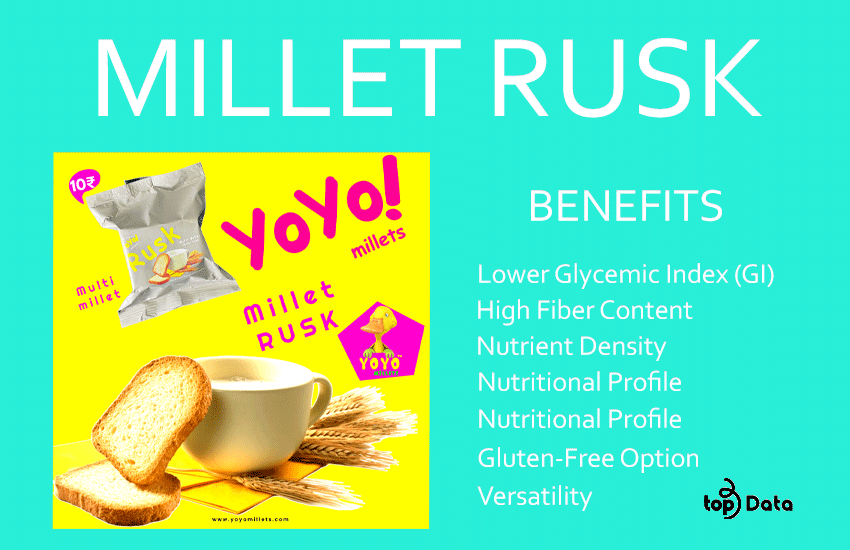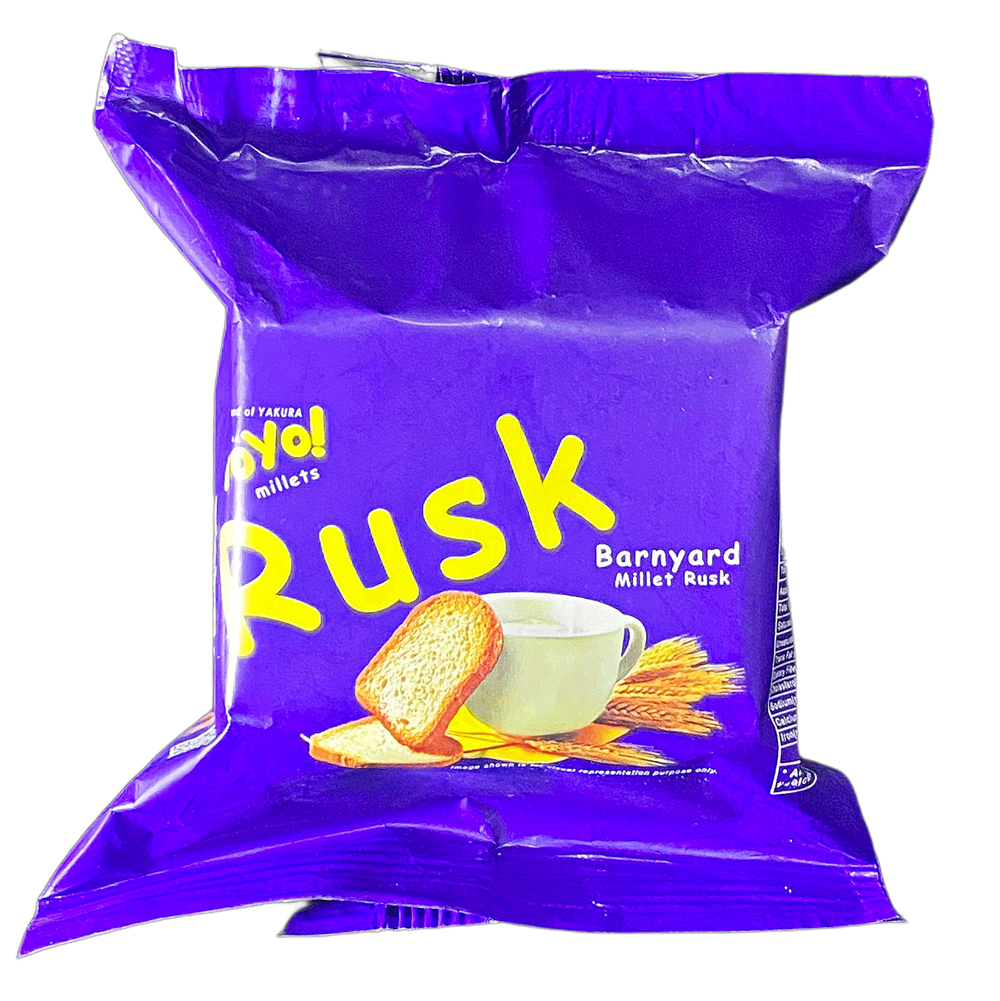Millet rusk is a type of rusk made from millet flour. Rusks are double-baked bread or bread-like products that are crisp, dry, and often used as a snack or accompaniment to tea or coffee. Millet is a gluten-free grain, so millet rusks are suitable for those with gluten sensitivities or celiac disease. They can be flavored with various ingredients like spices or sweeteners depending on personal preference.
The process of making millet rusks involves several steps, but it's not overly complicated. Here's a simplified version of the process:
Preparation of Millet Flour: Millet grains are cleaned, washed, and then ground into flour. This can be done using a grain mill or a commercial flour mill.
Mixing: Millet flour is mixed with other ingredients like water, yeast (or another leavening agent), salt, and sometimes sugar or other flavorings to form a dough. The dough is kneaded until it reaches the desired consistency.
Rising: The dough is left to rise in a warm place until it doubles in size. This allows the yeast to ferment and create air bubbles, which gives the rusks their light texture.
Shaping: After rising, the dough is punched down to remove excess air and then shaped into loaves or rolls.
Baking: The shaped dough is baked in an oven at a moderate temperature until it is cooked through and develops a golden crust.
Cooling: Once baked, the loaves or rolls are removed from the oven and allowed to cool completely.
Slicing: Once cooled, the loaves or rolls are sliced into pieces of the desired thickness.
Second Baking: The sliced pieces are then arranged on baking sheets and baked again at a lower temperature to dry them out and give them their characteristic crisp texture. This second baking also extends their shelf life.
Cooling and Packaging: After the second baking, the rusks are allowed to cool completely before being packaged for storage or sale.
While these steps require some time and attention to detail, they are relatively straightforward, and making millet rusks at home is certainly achievable for those with basic baking skills and equipment. Commercial production may involve larger-scale machinery and automated processes but follows a similar series of steps.
In India, millet rusks are not as common as wheat or other grain-based rusks, but they are becoming more popular due to the increasing interest in millets as a nutritious alternative to wheat and rice. Millets have been a staple in many parts of India for centuries, particularly in regions like Karnataka, Tamil Nadu, and Telangana.
The process of making millet rusks in India would be similar to the general process I described earlier. Millet flour would be prepared from locally available millet grains, such as finger millet (ragi), pearl millet (bajra), or foxtail millet (kangni). The flour would then be mixed with water, yeast or another leavening agent, salt, and possibly other ingredients like sugar, spices, or nuts, depending on regional preferences.
The shaped dough would be allowed to rise, baked, sliced, and then undergo a second baking to achieve the desired crisp texture. The specific ingredients and flavors used in millet rusks may vary depending on regional traditions and personal preferences.
As millets gain more attention for their health benefits and versatility, it's likely that the availability and variety of millet-based products like rusks will continue to increase in India
Millet rusks can be a healthy option, particularly for individuals who are looking for alternatives to wheat-based products or who have gluten sensitivities. Here are some reasons why millet rusks can be considered healthy:
Nutritional Profile: Millets, including finger millet (ragi), pearl millet (bajra), and others, are whole grains that are rich in nutrients like fiber, vitamins (especially B vitamins), minerals (such as iron, magnesium, and phosphorus), and antioxidants.
Gluten-Free: Millets are naturally gluten-free, making millet rusks suitable for those with gluten sensitivities, wheat allergies, or celiac disease.
Low Glycemic Index: Millets generally have a lower glycemic index compared to refined grains like wheat, which means they have less of an impact on blood sugar levels. This can be beneficial for managing blood sugar and insulin levels, especially for individuals with diabetes or those looking to control their weight.
High Fiber Content: Millets are a good source of dietary fiber, which is important for digestive health, maintaining a healthy weight, and reducing the risk of chronic diseases like heart disease and type 2 diabetes. Fiber also helps keep you feeling full and satisfied, which can aid in weight management.
Versatility: Millet rusks can be flavored and seasoned in various ways to suit different tastes and preferences, making them a versatile snack or accompaniment to meals.
Whole Grain Benefits: Millet rusks made from whole grain millet flour retain the nutritional benefits of the whole grain, including its fiber content and micronutrients.
However, it's important to note that the overall healthiness of millet rusks can also depend on factors such as portion size, added ingredients (like sugar or fats), and how they fit into an individual's overall diet. As with any food, moderation and balance are key.
Millet rusks can be a good option for individuals with diabetes, primarily because millets generally have a lower glycemic index compared to refined grains like wheat. Here's how millet rusks can potentially benefit individuals with diabetes:
Lower Glycemic Index (GI): Foods with a lower glycemic index cause a slower and lower rise in blood glucose levels compared to foods with a higher glycemic index. Millets, including those used to make millet rusks, typically have a lower glycemic index. This means they can help stabilize blood sugar levels and prevent spikes in glucose levels after consumption.
High Fiber Content: Millets are rich in dietary fiber, which is beneficial for individuals with diabetes. Fiber helps slow down the absorption of sugar in the bloodstream, which can help regulate blood sugar levels. It also promotes satiety, which may aid in weight management, another important aspect of diabetes management.
Nutrient Density: Millets are packed with essential nutrients such as vitamins, minerals, and antioxidants. While the exact nutritional content can vary depending on the type of millet used and how the rusks are prepared, choosing whole grain millet rusks can provide valuable nutrients that support overall health.
Gluten-Free Option: For individuals with diabetes who also have celiac disease or gluten intolerance, millet rusks offer a gluten-free alternative to wheat-based products.
Portion Control: As with any food, portion control is important for managing blood sugar levels. While millet rusks can be a healthy option, it's essential to be mindful of portion sizes and to balance them with other components of a balanced diet.
Overall, incorporating millet rusks into a diabetes-friendly diet can be a healthy choice, but it's important to consider individual dietary needs and preferences, as well as consult with a healthcare provider or registered dietitian for personalized guidance on managing blood sugar levels.

Millet rusks offer several potential benefits, especially when compared to traditional wheat-based rusks. Here are some of the advantages:
Gluten-Free: Millet rusks are made from millet flour, which is naturally gluten-free. This makes them suitable for individuals with gluten sensitivities, celiac disease, or wheat allergies.
Lower Glycemic Index: Millets, including those used in millet rusks, typically have a lower glycemic index compared to refined wheat flour. Foods with a lower glycemic index cause a slower and more gradual increase in blood sugar levels, which can be beneficial for overall health, especially for individuals managing diabetes or trying to control blood sugar levels.
Rich in Nutrients: Millets are nutrient-dense grains that are rich in essential vitamins, minerals, and antioxidants. They provide nutrients such as magnesium, phosphorus, iron, and B vitamins, which are important for overall health, energy production, and immune function.
High in Fiber: Millet rusks are a good source of dietary fiber, which is essential for digestive health, promoting satiety, and regulating blood sugar levels. High-fiber diets have been linked to a reduced risk of heart disease, stroke, type 2 diabetes, and certain types of cancer.
Versatility: Millet rusks can be flavored and seasoned in various ways to suit different tastes and preferences. They can be enjoyed plain or with toppings such as cheese, jam, nut butter, or hummus, making them a versatile and customizable snack or accompaniment to meals.
Satisfying Crunch: Rusks are double-baked, resulting in a crisp and crunchy texture. This satisfying crunch can make them enjoyable to eat as a snack or dipped into beverages like tea or coffee.
Longer Shelf Life: The double-baking process used to make rusks helps extend their shelf life compared to regular bread. This can make them a convenient option for busy individuals or for stocking up on nutritious snacks.
Overall, millet rusks offer a nutritious and flavorful alternative to traditional wheat-based rusks, with the added benefits of being gluten-free and rich in essential nutrients and fiber.

Description:
Barnyard Millet Rusk enhance your tea time experience
Barnyard Millet is rich in Magnesium which helps improve heart health
Dietary fiber is also beneficial to the digestive tract
Rich fiber helps to Manage reduce glucose absorption into the blood stream
Ingredients:
Wheat Flour (54%), Barnyard Millet Flour (22%) (Finger Millet, Pearl Millet, Kodo Millet, Barnyard Millet, Little Millet, Sorghum Millet), Unrefined Cane Sugar (20%), Vital Wheat Gluten (2%), Bread Improvers [1100(I), 1102, 1104 ] Vegetable oil (Palm, 1.5%) and Cardamom
Millet Rusk :
1. Millet Rusk suitable for all age groups(from 1 year old)
2. Rich in fibers and proteins
3. 100% vegetarian
4. No preservatives,
5. Free from Artificial colors & flavors
6. Trans fat free
7. Sweetened with Jaggery
8. Vegan (No Dairy Products)
9. Better to serves with tea or coffee
Best before 6 months from the date of packaging
Allergen Declaration: Contains wheat, Wheat Gluten, Packed in a facility that also handles Nuts, Soya and seeds

Description
Multi Millet Rusk enhance your tea time experience
Multi millet is rich in Magnesium which helps improve heart health
Dietary fiber is also beneficial to the digestive tract
Rich fiber helps to Manage reduce glucose absorption into the bloodstream
Ingredients:
Wheat Flour (54%), Multi Millet Flour (22%) (Finger Millet, Pearl Millet, Kodo Millet, Barnyard Millet, Little Millet, Sorghum Millet), Unrefined Cane Sugar (20%), Vital Wheat Gluten (2%), Bread Improvers [1100(I), 1102, 1104 ] Vegetable oil (Palm, 1.5%) and Cardamom
Millet Rusk :
1. Millet Rusk suitable for all age groups(from 1 year old)
2. Rich in fibers and proteins
3. 100% vegetarian
4. No preservatives,
5. Free from Artificial colors & flavors
6. Trans fat free
7. Sweetened with Jaggery
8. Vegan (No Dairy Products)
9. Better to serves with tea or coffee
10. Best before 6 months from the date of packaging
Allergen Declaration: Contains wheat, Wheat Gluten, Packed in a facility that also handles Nuts, Soya and seeds